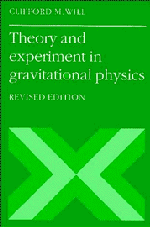Book contents
- Frontmatter
- Contents
- Preface to Revised Edition
- Preface to First Edition
- 1 Introduction
- 2 The Einstein Equivalence Principle and the Foundations of Gravitation Theory
- 3 Gravitation as a Geometric Phenomenon
- 4 The Parametrized Post-Newtonian Formalism
- 5 Post-Newtonian Limits of Alternative Metric Theories of Gravity
- 6 Equations of Motion in the PPN Formalism
- 7 The Classical Tests
- 8 Tests of the Strong Equivalence Principle
- 9 Other Tests of Post-Newtonian Gravity
- 10 Gravitational Radiation as a Tool for Testing Relativistic Gravity
- 11 Structure and Motion of Compact Objects in Alternative Theories of Gravity
- 12 The Binary Pulsar
- 13 Cosmological Tests
- 14 An Update
- References
- References to Chapter 14
- Index
2 - The Einstein Equivalence Principle and the Foundations of Gravitation Theory
Published online by Cambridge University Press: 04 April 2011
- Frontmatter
- Contents
- Preface to Revised Edition
- Preface to First Edition
- 1 Introduction
- 2 The Einstein Equivalence Principle and the Foundations of Gravitation Theory
- 3 Gravitation as a Geometric Phenomenon
- 4 The Parametrized Post-Newtonian Formalism
- 5 Post-Newtonian Limits of Alternative Metric Theories of Gravity
- 6 Equations of Motion in the PPN Formalism
- 7 The Classical Tests
- 8 Tests of the Strong Equivalence Principle
- 9 Other Tests of Post-Newtonian Gravity
- 10 Gravitational Radiation as a Tool for Testing Relativistic Gravity
- 11 Structure and Motion of Compact Objects in Alternative Theories of Gravity
- 12 The Binary Pulsar
- 13 Cosmological Tests
- 14 An Update
- References
- References to Chapter 14
- Index
Summary
The Principle of Equivalence has played an important role in the development of gravitation theory. Newton regarded this principle as such a cornerstone of mechanics that he devoted the opening paragraphs of the Principia to a detailed discussion of it (Figure 2.1). He also reported there the results of pendulum experiments he performed to verify the principle. To Newton, the Principle of Equivalence demanded that the “mass” of any body, namely that property of a body (inertia) that regulates its response to an applied force, be equal to its “weight,” that property that regulates its response to gravitation. Bondi (1957) coined the terms “inertial mass” m1 and “passive gravitational mass” mp, to refer to these quantities, so that Newton's second law and the law of gravitation take the forms
F = m1a, F = mPg
where g is the gravitational field. The Principle of Equivalence can then be stated succinctly: for any body mP = m1
An alternative statement of this principle is that all bodies fall in a gravitational field with the same acceleration regardless of their mass or internal structure. Newton's equivalence principle is now generally referred to as the “Weak Equivalence Principle” (WEP).
It was Einstein who added the key element to WEP that revealed the path to general relativity.
Information
- Type
- Chapter
- Information
- Theory and Experiment in Gravitational Physics , pp. 13 - 66Publisher: Cambridge University PressPrint publication year: 1993
